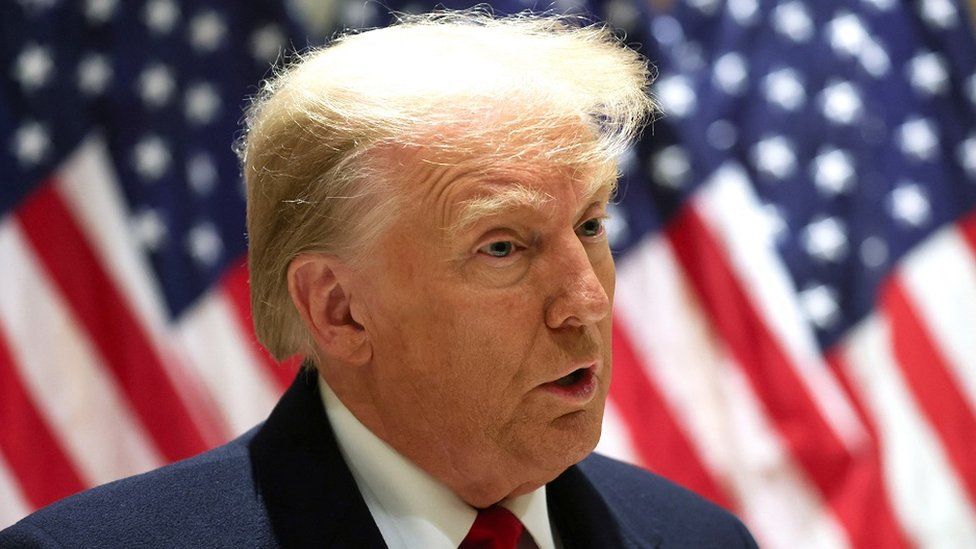
Donald Trump does not have presidential immunity and can be prosecuted on charges of plotting to overturn the 2020 election, a US court has ruled.
Mr Trump had claimed in the landmark legal case that he was immune from criminal charges for acts he said fell within his duties as president.
But Tuesday's unanimous ruling in Washington DC struck down that claim.
It is a setback for Mr Trump who has for years cited presidential immunity while battling multiple cases.
"We cannot accept former President Trump's claim that a president has unbounded authority to commit crimes that would neutralise the most fundamental check on executive power - the recognition and implementation of election results," the three-judge appeals court panel wrote in its opinion.
It added: "For the purpose of this criminal case, former President Trump has become citizen Trump, with all of the defences of any other criminal defendant."
In a statement shortly after the ruling, Trump campaign spokesman Steven Cheung said the former president "respectfully disagrees with the DC Circuit's decision and will appeal it".
If an appeal is filed, the case could ultimately go to the Supreme Court where conservatives hold a 6-3 majority. Mr Trump has until 12 February to do so.
"If immunity is not granted to a president, every future president who leaves office will be immediately indicted by the opposing party," Mr Cheung said. "Without complete immunity, a president of the United States would not be able to properly function."

More on the US election
- Explained: A simple guide to the US 2024 election
- Policies: What a Trump second term would look like
- On the ground: Are black voters losing faith in Biden?
- Global: Why the world is watching so closely

US Special Counsel Jack Smith has charged Mr Trump, 77, with conspiring to overturn Joe Biden's victory in the 2020 election and committing fraud to stay in office.
The trial in that case was initially scheduled for 4 March, but was postponed pending a ruling on the immunity claim. It could be delayed for weeks, if not months, if the case ends up before the Supreme Court.
Last month, a panel of three judges heard the case at the US Court of Appeals for the DC Circuit.
The argument from Mr Trump's lawyer hinged on the idea that a president who is not convicted for impeachment by Congress cannot be subject to criminal proceedings. Mr Trump, they noted, was impeached by the House of Representatives but never convicted by the Senate.
The judge presiding over the trial had already rejected this argument in December. Judge Tanya Chutkan wrote at the time that the presidency "does not confer a lifelong 'get-out-of-jail-free' pass".
At the hearing, the judges - two Democratic appointees and one Republican appointee - were sceptical of the former president's argument.
One, Judge Florence Pan, suggested that immunity would allow a president to sell state secrets or order the assassination of a political rival without being concerned about criminal prosecution.
This video can not be played
To play this video you need to enable JavaScript in your browser.
https://news.google.com/rss/articles/CBMiM2h0dHBzOi8vd3d3LmJiYy5jby51ay9uZXdzL3dvcmxkLXVzLWNhbmFkYS02ODAyNjE3NdIBN2h0dHBzOi8vd3d3LmJiYy5jby51ay9uZXdzL3dvcmxkLXVzLWNhbmFkYS02ODAyNjE3NS5hbXA?oc=5
2024-02-06 16:03:21Z
CBMiM2h0dHBzOi8vd3d3LmJiYy5jby51ay9uZXdzL3dvcmxkLXVzLWNhbmFkYS02ODAyNjE3NdIBN2h0dHBzOi8vd3d3LmJiYy5jby51ay9uZXdzL3dvcmxkLXVzLWNhbmFkYS02ODAyNjE3NS5hbXA
Tidak ada komentar:
Posting Komentar